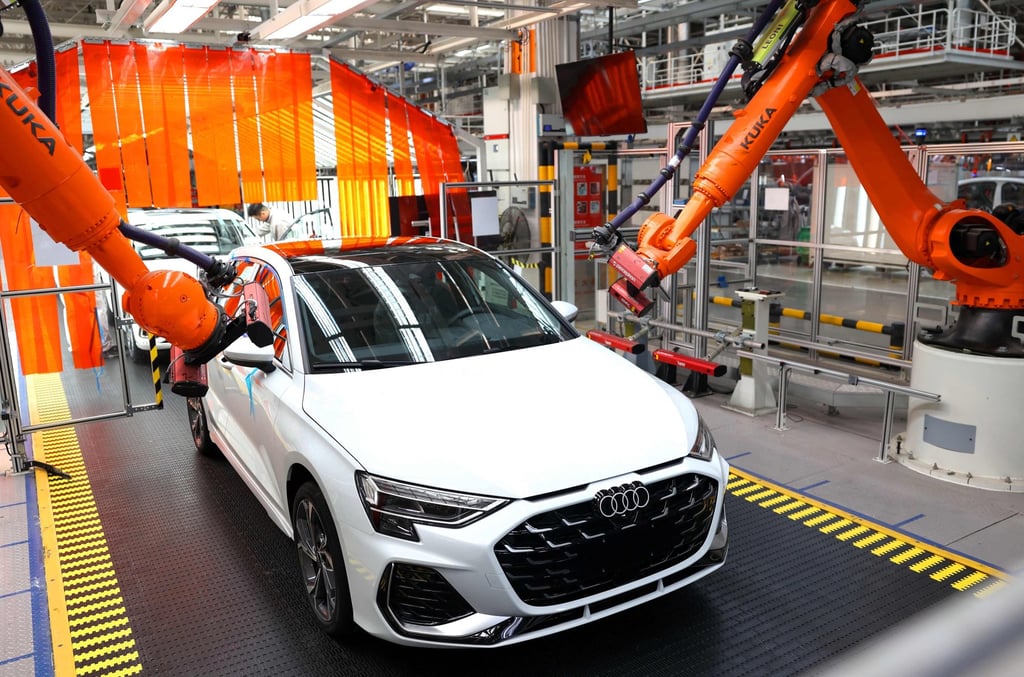Foreign carmakers from Volkswagen to General Motors (GM) and Nissan are fighting back in mainland China as they unveiled new electric vehicle (EV) models at the Auto Shanghai trade show, after losing their share to local rivals in the world’s largest automotive market.
The carmakers are banking on Chinese EV technologies to make their products “more electric and intelligent” so they can ramp up deliveries and catch up with indigenous brands that have seized more than 90 per cent of the EV segment over the past decade.
More than a dozen new EV models displayed by the global automotive giants at the auto show featured the latest Chinese technologies including batteries, digital cockpits and preliminary autonomous driving. The trade show, the world’s largest of its kind, opened on April 23 and will conclude on Friday.
“They still have strong interest in this market [as] there is no alternative to the Chinese market,” said Carlo Diego D’Andrea, chairman of the European Union Chamber of Commerce’s Shanghai chapter. “The things that [they] can do is keep investing and try to be part of the success story.”
Foreign manufacturers including VW, GM, Toyota and BMW have been losing their market share to domestic rivals since 2020 as Chinese consumers embrace pure-electric and plug-in hybrid cars from BYD, Nio, Li Auto and Xpeng amid state-driven efforts to boost clean energy and reduce emissions.
Chinese EV makers grew by leaps and bounds, buoyed by government subsidies and consumers’ willingness to embrace new technologies, eclipsing their foreign rivals in terms of manufacturing and design heft. The market share of foreign car brands fell to 40 per cent in 2024 from 50 per cent in 2023, the China Passenger Car Association said.
Diminished demand for foreign-branded vehicles – mostly petrol-powered cars – would lead to an overcapacity of 10 million units and a loss of up to US$20 billion in profits annually in China, according to a report published by Swiss investment bank UBS last year.
“Some leading global carmakers have been more adamant than ever to [incorporate] Chinese technologies and research and development (R&D) into their products,” UBS analyst Paul Gong said in a media briefing in Shanghai last week. “Over time, global carmakers will diverge in competitiveness between those who embrace Chinese R&D and those who avoid China exposure.”

Foreign marques are tapping local EV technologies in several ways: by using the platforms of their joint-venture partners, hiring local engineers to develop new EV models, setting up new China R&D teams and tying up with local technology suppliers to develop self-driving functions.
VW showcased its ID. EVO pure electric SUV that is based on Xpeng’s G9. The German carmaker, which spent US$700 million to buy a 5 per cent stake in Guangzhou-based Xpeng in 2023, enlisted its partner to help develop mid-sized battery-powered vehicles bearing VW badges to build its share of the mainland’s EV market.
Last year, VW’s China operations were eclipsed by BYD, the world’s largest EV builder in terms of deliveries, after it reported a 9.5 per cent decline in sales to 2.93 million units. The German company had been the market leader in China since it started local joint ventures with SAIC Motor and FAW from 1984.
GM’s Cadillac displayed its Vistiq electric sedan, which offers door-to-door urban-area navigation on autopilot capability using the algorithm from a Chinese supplier, Deutsche Bank said in a research note released on April 25. Buick would be using the same solution as Cadillac in China, it added.
Nissan, Toyota, Honda, Mercedes-Benz, Audi and BMW have also launched their new electric models featuring Chinese technologies, Deutsche Bank added.
Nissan published the prices for its new N7 sedan, which is fitted with a preliminary autonomous driving system. The fully-electric smart car starts at 119,900 yuan (US$16,494), on par with Xpeng’s Mona M03, which is one of China’s bestselling pure electric sedans.
“The foreign carmakers are set to win back some of their loyal customers in China,” said Phate Zhang, founder of Shanghai-based EV data provider CnEVPost. “But the new models cannot lure a big number of customers without competitive pricing. Most local consumers are price-conscious nowadays due to the weak economic outlook.”

